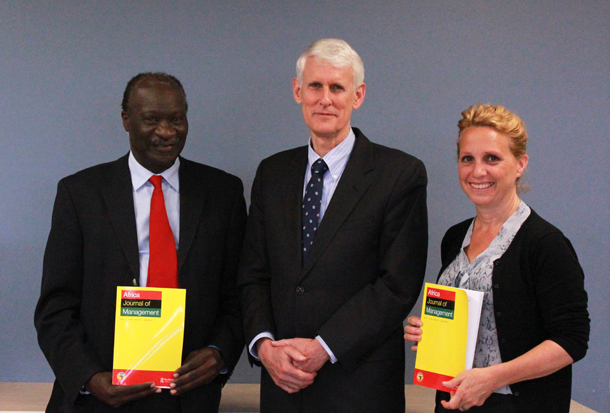Africa Journal of Management publishes first issue
The inaugural issue of the Africa Journal of Management (AJOM) is in press under the editorship of Moses Kiggundu, Professor of Management and International Business at the Sprott School of Business.
“The Africa Journal of Management was founded on the simple, but powerful idea that together we can make a difference in advancing management scholarship and practice in and about Africa,” said Moses, who serves as the journal’s founding editor.

After a top tier management journal devoted to the African context was announced at the 2014 Africa Academy of Management Conference in Gaborone, Botswana, Moses started the search for partners and members of the editorial board.
“The ‘A’ in AJOM demands a dose of activism,” said Moses. “You just do not sit at your desk in Ottawa and expect results. You have to go in the field, talk to the people and get your feet wet. I have made several trips to Africa and experienced promising leads, false starts, dead ends, and positive results.”
In speaking with constituents, Moses said two residual purposes and an opportunity became clear. The high quality research published in the journal aims to benefit both business and government, thereby leading to economic improvements in African countries. AJOM also strives to bolster the capacity for quality management research in African universities by providing an outlet; connecting Africa to the world and bringing the world to Africa. AJOM is a global publication.
Moses found that scholars around the world are interested in learning more about business and management in Africa and how their research might apply; meanwhile, African scholars are producing research specific to African issues and challenges, but they could not see how their research could be framed by or used to develop theory.
“We saw an opportunity to better inform the world about the African context so that interested researchers globally could better tackle the advancement of research, education and practice in Africa,” said Moses. “We also saw a need for a richer discussion of existing research and theory about management in Africa as a way to encourage future research.”
To address this opportunity, AJOM has three parts: high quality research articles, a discussion forum on research previously published in or relevant to the journal, and a forum for commentaries or contextualized research on the unique challenges of particular countries or regional issues.
Moses and his team are planning special issues on topics of critical importance for Africa’s sustainable and inclusive growth and development, such as management and regional integration and administrative theory and practice in francophone Africa.
“During AJOM’s first year, progress has been made, lessons are being learnt, opportunities emerge, and challenges remain,” said Moses. “The most important achievement is taking the practical steps to transform AJOM from an inspirational vision to a living publication.
“I would like to thank Carleton University, especially the Sprott School of Business and the Institute of African Studies for their continuing intellectual and material support. I would also like to recognize the excellent work by my Senior Associate Editor, Professor Bruce Lamont, The Florida State University, Tallahassee, and the whole editorial team.”
Africa Journal of Management is a publication of the Africa Academy of Management (AFAM) with support from the Academy of Management (AOM). It is published by Taylor and Francis four times a year.